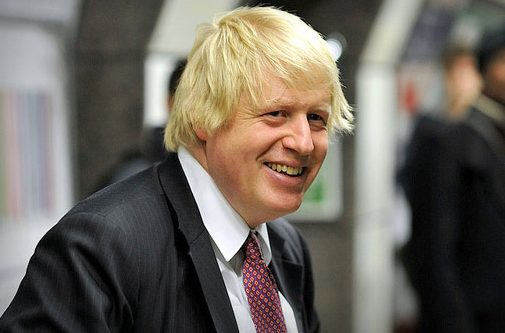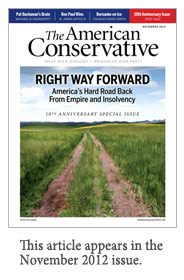Boris Johnson’s Coup

On a windy September day in London, I went out to see the post-Olympics “victory parade.” I found a good spot by a railing on a street in Westminster, near the Houses of Parliament, and watched as Britain’s Olympians and Paralympians filed past in their tracksuits and wheelchairs, showing off their medals. The atmosphere was cheerful, even jubilant. Suddenly, though, I heard a collective groan: David Cameron, the prime minister, had appeared, flanked by security men. “What’s he bloody doing here?” shouted a man on my left, and others laughed. Cameron waved awkwardly and hurried on. He must have been able to hear the roar behind him. Another hero was coming. A chant started up: “Bo-ris! Bo-ris! Bo-ris!” And there he was, Boris Johnson, mayor of London. He milked the adulation. “Thank you all for coming,” he said, as if it were his party—which, in a way, it was.
It’s been a great year for Alexander Boris de Pfeffel Johnson, the journalist turned would-be Conservative prime minister. In May, he won re-election as London mayor. Then, in time for the Olympics, he transformed himself into a sort of national mascot, popping up everywhere, spreading good cheer. He mocked Mitt Romney, who had suggested that London was not ready to host the games, and everybody fell about laughing. Even Johnson’s supposed gaffes—episodes that might have sunk another politician—worked in his favor. A funny video of him stuck on a zip wire during a botched publicity stunt went viral. That’s our Boris, everyone thought.
Until recently, talk of Johnson succeeding Cameron was not much heard outside newspaper offices and Westminster pubs. Dave vs. Boris seemed a fun story—two upper-middle-class boys who went to Eton and Oxford, locked in a fierce rivalry—but not much more. Serious politicos scoffed at the thought of Boris as PM. He has to see out his term as mayor, they said, which would keep him out of Parliament until 2016. The next general election will be in 2015. In August, a book called Prime Minister Johnson and Other Things That Never Happened was published.
But that’s old hat now. In the summer, the Westminster experts suddenly realized that Boris had become something new in British politics: a genuinely popular right-wing politician. Journalists began pointing out, again and again, that he is the only active Conservative politician to have won a major election. At the Conservatives’ annual conference in October, he was hailed as the man who could save the party. (Cameron may be prime minister, but he governs in coalition with the Liberal Democrats.) Polls suggest that Johnson-led party might be as much 50 seats better off than under David Cameron. The question today is not whether Boris will make a bid for the leadership, but when and how.
Boris still publicly professes loyalty to Cameron. Yet his private but well-reported contempt for Cameron—whom he regards as an intellectual inferior—is shared by many disgruntled Tories, and he has been successfully maneuvering against the prime minister for some time. As London mayor, he has outflanked Cameron on the right, while using his superior charms to endear himself to the middle. While Cameron ducks questions of Britain’s membership of the European Union, Boris has signed a “people’s pledge” for an in-or-out referendum. While Cameron annoys right-wingers with his commitment to subsidized green energy and international aid, Boris attacks the governing coalition for failing to support the “struggling middle” of society.
Boris is not a traditional conservative. He’s a libertarian and something of a libertine. He’s in favor of gay rights and recently upset religious groups by saying that Britain needed “to move beyond the stone age” and redefine marriage. Certainly, he doesn’t seem constrained by his own marriage vows. He has no interest in Christianity, beyond a fondness for Anglican Hymns and the King James Bible. He’s a pagan, really, obsessed with classical literature and his sense of his own destiny. “He’s very superstitious,” says Mary Wakefield, his friend and former colleague. “If he saw BJW on a car number plate, for instance, he’d think that meant Boris Johnson Wins. “
Yet Boris’s outlandishness is exactly what people outside of the right like about him. He is a great anti-politician, the opposite of slick. He always looks and acts unprepared. His hair—the much discussed “blond mop”—is professionally messy. He seems to get the joke, too, in a way that no other modern statesman does. He can’t stop himself from acknowledging the absurdity of being a public figure. Young people love him, according to the polls. Everything he touches instantly becomes imbued with a hilarious Borisness.
 For now the gods seem to be smiling on BJ, but as a classicist he must know that nemesis awaits. “Boris mania” will ebb. As he gets closer to real power, and the seriousness of his ambition becomes clear, his carefree image starts to look false. All that jollity might even seem a little sinister. Max Hastings wrote a much-read piece in the Daily Mail in which he said that Boris was not to be “trusted with your woman or your wallet.” Others described his light-hearted tribute to David Cameron at the party conference—“If I am a mop … then you are a broom, a broom that is sweeping up the mess left by the Labour government”—as “menacing.”
For now the gods seem to be smiling on BJ, but as a classicist he must know that nemesis awaits. “Boris mania” will ebb. As he gets closer to real power, and the seriousness of his ambition becomes clear, his carefree image starts to look false. All that jollity might even seem a little sinister. Max Hastings wrote a much-read piece in the Daily Mail in which he said that Boris was not to be “trusted with your woman or your wallet.” Others described his light-hearted tribute to David Cameron at the party conference—“If I am a mop … then you are a broom, a broom that is sweeping up the mess left by the Labour government”—as “menacing.”
Cameron, by contrast, seems positively gracious and restrained, and he emerged from the recent party conference in better standing than anybody had anticipated. He laughs when Boris ribs him in public and has taken to praising his rival at every opportunity. “I have got the opposite of tall poppy syndrome,” he said, when asked about Boris’s success. “I like having other people in the Conservative Party who are popular, who get out there, talk our message and explain our vision and values.” It would be an irony if, rather than sinking Cameron, Boris ended up reminding Conservatives why they liked him in the first place.
Freddy Gray is assistant editor of The Spectator.
Comments